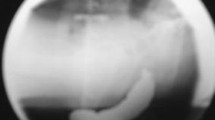Abstract
Background
This study investigated ways to reduce the rate of slow-transit constipation after radical hysterectomy type III.
Methods
A prospective study was conducted involving 59 consecutive patients with cervical cancer stage IB1-IIIA at high risk for parametrial or lymph node involvement who were treated between May 1996 and March 1999 by laparoscopically assisted radical vaginal hysterectomy type III.
Results
During laparoscopic transection of the cardinal ligament, particular attention was focused on conservation of the pelvic splanchnic nerves. After vaginal removal of the uterus, a vaginal sacrocolporectopexy was performed transvaginally. Nerve preservation and pexy of the rectum allowed a significant reduction of postoperative constipation, as compared with classic radical hysterectomy without conservation of the splanchnic pelvic nerves and without sacrocolporectopexy.
Conclusion
Refinements in the preparation of the parasympathetic nerves during radical pelvic surgery and refixation of the terminal rectum helps to prevent postoperative constipation.
Similar content being viewed by others
References
Berman IR (1992) Sutureless laparoscopic rectopexy for procidentia: technique and implications. Dis Colon Rectum 35: 689–693
Birnbaum EH, Myerson RJ, Fry RD, Kodner IJ, Fleshman JW (1994) Chronic effects of pelvic radiation therapy on anorectal function. Dis Colon Rectum 37: 909–915
Herold A, Bruch HP (1997) Laparoskopische Rektopexie. Zentralbl Chir 122: 578–585
Lubowski DZ, Chen FC, Kennedy ML, King DW (1996) Results of colectomy for severe slow-transit constipation. Dis Colon Rectum 39: 23–29
Mundy AR (1982) An anatomical explanation for bladder dysfunction following rectal and uterine surgery. Br J Urol 54: 501–504
Photopulos GJ, Zwaag RV (1991) Class II radical hysterectomy shows less morbidity and good treatment efficacy compared to class III. Gynecol Oncol 40: 21–24
Possover M, Krause N, Schneider A (1998) Laparoscopic assistance for extended radicality of vaginal radical hysterectomy: description of a technique. Gynecol Oncol 70: 94–99
Possover M, Stober S, Plaul K, Schneider A (2000) Identification and preservation of the motoric innervation of the bladder in radical hysterectomy type III. Gynecol Oncol 79: 54–157
Prior A, Stanley KM, Smith AR, Read NW (1992) Relation between hysterectomy and the irritable bowel: a prospective study [see comments] Gut 33: 814–817
Seski JC, Dioknu AC (1977) Bladder dysfunction after radical abdominal hysterectomy. Am J. Obstet Gynecol 128: 643–651
Snooks SJ, Barnes PR, Swash M, Henry MM (1985) Damage to the innervation of the pelvic floor musculature in chronic constipation. Gastroenterology 89: 977–981
Thornton NW, Charlottesville VA (1954) Late urinary system complications following radical hysterectomy for carcinoma of the cervix. Am J Obstet Gynecol 67: 867–882
Varma JS (1992) Autonomic influences on colorectal motility and pelvic surgery. World J Surg 16: 811
Vierhout Me, Schreuder HW, Veen HF (1993) Severe slow-transit constipation following radical hysterectomy. Gynecol Oncol 51: 401–403
Author information
Authors and Affiliations
Additional information
Online publication: 8 February 2002
Rights and permissions
About this article
Cite this article
Possover, M., Schneider, A. Slow-transit constipation after radical hysterectomy type III. Surg Endosc 16, 847–850 (2002). https://doi.org/10.1007/s00464-001-9082-x
Received:
Accepted:
Issue Date:
DOI: https://doi.org/10.1007/s00464-001-9082-x




